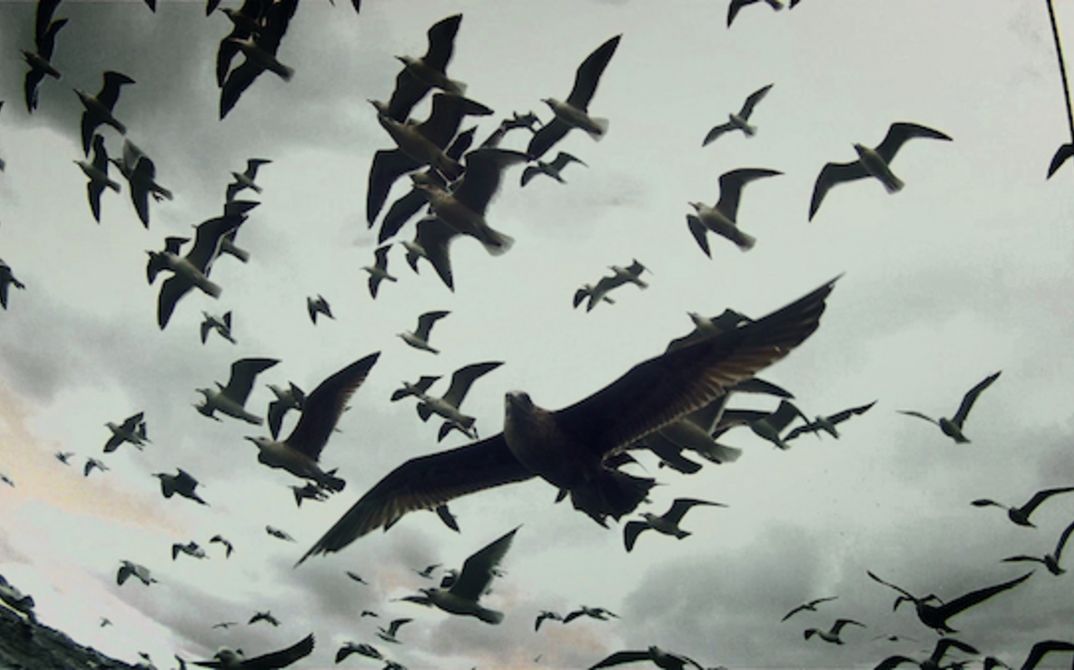The Sensory Ethnography Lab (SEL) at Harvard University, directed by Lucien Castaing-Taylor, is one of today's most interesting production facilities for documentary film and cinematographic research, where social and natural sciences enter into a subtle relationship with analogue and digital media art. Sound and image become the seismographs of a physical experiential world inhabited by people, animals and spirits. In March, the www.arsenal-3-berlin.de streaming platform will present six of the films made between 2009 and 2017 that are in our distribution range and were shown in the Forum and Forum Expanded at the Berlinale.
LEVIATHAN (Lucien Castaing-Taylor, Véréna Paravel, USA 2013, 85 min)
Castaing-Taylor and Párável spent a year at sea with deep-sea fishermen from New England.The portrait of fishing work created as a result stands in the old tradition of using fishermen as visual motifs. And yet the film entirely resists the sort of romanticization and anthropocentrism that often go hand in hand with this tradition, evoking instead a less emotional relationship between humankind and the ocean and giving equal weight to the human, ecological and industrial in aesthetic and ontological terms. In the same waters in which Melville's ship Pequod hunted Moby Dick, LEVIATHAN captures the head-on collision between humanity, nature and machine. Shot using a dozen cameras that are swirled around, attached to different places and passed from fisherman to filmmaker, a cosmic portrait of one of humankind's oldest endeavors gradually comes into focus.
SWEETGRASS (Lucien Castaing-Taylor und Ilisa Barbash, USA 2009, 103 min)
The anthropologists and filmmakers Lucien Castaing-Taylor and Ilisa Barbash spent three summers documenting sheep farming at one of the last family-owned ranches in the Absaroka-Beartooth Mountains. Without a didactic voiceover commentary, without interviews, without music and certainly without artificial dramatics, the filmmakers observes the lives of their protagonists and create a portraits of sheep, shepherds, and the natural world that surrounds them. The raw humor of the ranchers among themselves while they brand the animals equally tells the story of sheep farming in the open air in the American West, which began in the 19th century and is slowly coming to an end.
MANAKAMANA (Stephanie Spray, Pacho Velez, Nepal/USA 2013, 118 min)
The film uses fixed camera shots to observe pilgrims, tourists and animals as they take the cable car to the Manakamana Temple of Hindu goddess Bhagwati in Nepal.Each of the twelve shots is one cable car ride, twelve portraits of people and the landscape and culture that surrounds them. The film is at once a cinematic trance, a conceptual transgression and ethnographical study.
FOREIGN PARTS (Véréna Paravel, J.P. Sniadecki, USA/F 2010, 80 min)
FOREIGN PARTS is the portrait of a run-down industrial quarter on the edge of Queens which Paravel and J.P. Sniadecki visited over a two year period. The film observes the controversial expropriation of a neighborhood before it founders in New York's capitalist city ecology. "FOREIGN PARTS shows how these people live and work in the worst possible conditions and yet still try to evade the impending redevelopment of their quarter. The film’s dramatic structure allows the viewer to get to know the location slowly, almost as if by touch alone, to see the unconventional beauty of the car parts, to get close to its inhabitants and to experience their stories and daily battles for survival. One is ensnared by a place that has nothing beautiful about it but is captivating nonetheless." (Christine Dériaz)
YUMEN (J.P. Sniadecki, Xu Ruotao, Huang Xiang, China/USA 2013, 65 min)
Set in the quasi-ghost town of Yumen, which once thrived with oil production in China’s arid northwest Gansu province, YUMEN is a haunting, fragmented tale of hungry souls, restless youth, a wandering artist, and a lonely woman, all searching for human connection and a collective past among the town’s crumbling landscape. One part “ruin porn,” one part ghost story, and shot entirely on 16mm, the film brings together narrative gesture, performance art, and socialist realism into a crude and radiant collage that not only plays with convention and defies genre, but also pays homage to a disappearing life-world and a fading medium.
somniloquies (Lucien Castaing-Taylor, Véréna Paravel, F/GB/USA 2017, 73 min)
Songwriter Dion McGregor became famous in the 1960s for narrating his dreams inhis sleep. His flatmate recorded him doing so. In somniloquies, Lucien Castaing-Taylor and Véréna Paravel overcome the boundaries between inner dreamscapes and human bodies. At the start, flowing forms can be seen and a gentle, undefinable sound made out in the background. McGregor's voice appears and makes an invitation: “I have expected you, come-on in, I said I would grant an interview.” The more we listen to him and enter into his dreamworld, the clearer the contours of the sleeping bodies become, before they seem to dissipate once again.
arsenal 3 is available for a monthly fee of 11€. Information and registration here.



